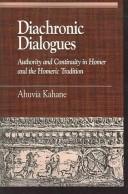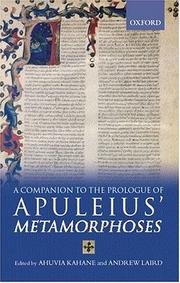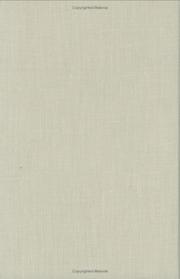| Listing 1 - 10 of 11 | << page >> |
Sort by
|

ISBN: 0198140770 9780198140771 Year: 1994 Volume: *1 Publisher: Oxford: Clarendon,
Abstract | Keywords | Export | Availability | Bookmark
 Loading...
Loading...Choose an application
- Reference Manager
- EndNote
- RefWorks (Direct export to RefWorks)
Ancient rhetoric --- Antieke retoriek --- Herhaling (Retoriek) --- Repetition (Rhetoric) --- Retoriek [Antieke ] --- Retoriek van de Oudheid --- Rhetoric [Ancient ] --- Rhétorique ancienne --- Rhétorique de l'Antiquité --- Répétition (Rhétorique) --- -Epic poetry --- Heroic poetry --- Répétition (Rhétorique) --- Repetition (Rhetoric). --- Epic poetry --- Greek language --- Poetics --- Rhetoric, Ancient --- Classical languages --- Greek rhetoric --- Latin language --- Latin rhetoric --- Rhetoric --- Literary style --- Poetry --- Technique --- Metrics and rhythmics --- History --- Homer --- Homeros --- Homère --- Technique. --- Rhetoric, Ancient. --- Homerus --- Metrics and rhythmics. --- Poésie épique --- Grec (Langue) --- Rhétorique ancienne --- Métrique et rythmique --- Homer - Technique. --- Epic poetry - Technique. --- Hóiméar --- Hūmīrūs --- Gomer --- Omir --- Omer --- Omero --- Ho-ma --- Homa --- Homérosz --- האמער --- הומירוס --- הומר --- הומרוס --- هومر --- هوميروس --- 荷马 --- Ὅμηρος --- Гамэр --- Hamėr --- Омир --- Homero --- 호메로스 --- Homerosŭ --- Homērs --- Homeras --- Хомер --- ホメーロス --- ホメロス --- Гомер --- Homeri --- Hema --- Pseudo-Homer --- Pseudo Omero --- Greek language - Metrics and rhythmics. --- Poetics - History - To 1500.
Book
ISBN: 9780715636770 Year: 2007 Publisher: London : Duckworth,
Abstract | Keywords | Export | Availability | Bookmark
 Loading...
Loading...Choose an application
- Reference Manager
- EndNote
- RefWorks (Direct export to RefWorks)

ISBN: 0739111345 0739111337 Year: 2005 Volume: *14 Publisher: Lanham, MA Rowman and Littlefield Publishing
Abstract | Keywords | Export | Availability | Bookmark
 Loading...
Loading...Choose an application
- Reference Manager
- EndNote
- RefWorks (Direct export to RefWorks)
Authority in literature. --- Epic poetry, Greek --- Ethics, Ancient, in literature. --- Influence (Literary, artistic, etc.) --- Intertextuality. --- Intertexuality. --- History and criticism. --- History --- Homer --- Criticism and interpretation. --- Influence.
Book
ISBN: 9781441100108 9781441179463 Year: 2012 Publisher: London [etc.] Bloomsbury Academic
Abstract | Keywords | Export | Availability | Bookmark
 Loading...
Loading...Choose an application
- Reference Manager
- EndNote
- RefWorks (Direct export to RefWorks)

ISBN: 0198152388 Year: 2001 Publisher: Oxford [etc.] : Oxford University Press,
Abstract | Keywords | Export | Availability | Bookmark
 Loading...
Loading...Choose an application
- Reference Manager
- EndNote
- RefWorks (Direct export to RefWorks)
Prologues and epilogues --- Latin fiction --- Mythology, Classical, in literature. --- Prologues et épilogues --- Roman latin --- Mythologie ancienne dans la littérature --- History and criticism. --- Histoire et critique --- Apuleius. --- -Mythology, Classical, in literature --- -Epilogues --- Postscripts (Epilogues) --- Prefaces --- Latin literature --- History and criticism --- Apuleius --- Apulien --- Apulée --- Apuleius Madaurensis --- Appuleius, Lucius --- Apuleius, Lucius --- Apuleio --- Apuleyo, Lucio --- Abūliyūs, Lūkiyūs --- Apuleius, --- Apuleius Platonicus Madaurensis --- Apuleu --- אפוליאוס --- לוקיוס, אפוליאוס --- ابوليوس --- Appuleius, --- -History and criticism --- Prologues et épilogues --- Mythologie ancienne dans la littérature --- Mythology, Classical, in literature
Book
Year: 1947 Publisher: Washington : National Advisory Committee for Aeronautics,
Abstract | Keywords | Export | Availability | Bookmark
 Loading...
Loading...Choose an application
- Reference Manager
- EndNote
- RefWorks (Direct export to RefWorks)
Airplanes --- Fans (Machinery) --- Aerofoils. --- Pressure. --- Charts, diagrams, etc. --- Motors --- Cooling.

ISBN: 0674962605 0674020464 9780674020467 9780674962606 0674261887 Year: 1997 Volume: 1 Publisher: Cambridge, Mass. : Harvard University Press,
Abstract | Keywords | Export | Availability | Bookmark
 Loading...
Loading...Choose an application
- Reference Manager
- EndNote
- RefWorks (Direct export to RefWorks)
Written Voices, Spoken Signs is a stimulating introduction to new perspectives on Homer and other traditional epics. Taking advantage of recent research on language and social exchange, the nine essays in this volume focus on performance and audience reception of oral poetry. These innovative essays by leading scholars of Homer, oral poetics, and epic invite us to rethink some key concepts for an understanding of traditional epic poetry. Egbert Bakker examines the epic performer's use of time and tense in recounting a past that is alive. Tackling the question of full-length performance of the monumental Iliad, Andrew Ford considers the extent to which the work was perceived as a coherent whole in the archaic age. John Miles Foley addresses questions about spoken signs and the process of reference in epic discourse, and Ahuvia Kahane studies rhythm as a semantic factor in the Homeric performance. Richard Martin suggests a new range of performance functions for the Homeric simile. And Gregory Nagy establishes the importance of one feature of epic language, the ellipsis. These six essays centered on Homer engage with fundamental issues that are addressed by three essays primarily concerned with medieval epic: those by Franz Bäuml on the concept of fact; by Wulf Oesterreicher on types of orality; and by Ursula Schaefer on written and spoken media. In their Introduction the editors highlight the underlying approach and viewpoints of this collaborative volume.Reviews of this book: "Despite its wide range of topics and approaches, the volume has a clear thematic focus. All contributors seek to leave behind the more formal concerns of past generations of scholars and aim instead at an understanding of orality as that which is (conceptually or actually) close, immediate, or performed. In their joint search for the new picture, classicists, linguists, and medievalists discover a range of different 'oralities'." --J. Haubold, Classical Review
Epic poetry --- Literature, Comparative --- Mythology, Greek, in literature --- Written communication --- Oral interpretation of poetry --- Oral-formulaic analysis --- Oral tradition --- History and criticism --- Theory, etc. --- Congresses. --- Greek and medieval --- Medieval and Greek --- Comparative literature --- Theory, etc --- Poésie épique --- Littérature comparée --- Poésie --- Communication écrite --- Analyse des formules orales --- Tradition orale --- Congresses --- Histoire et critique --- Théorie, etc. --- Congrès --- Grecque et médiévale --- Lecture publique --- Homer --- Criticism and interpretation --- Greek and Medieval --- Formulaic analysis, Oral --- Poetry reading --- Reading poetry aloud --- Heroic poetry --- Tradition, Oral --- Oral communication --- Folklore --- Oral history --- Folk literature --- Poetry --- Written discourse --- Written language --- Communication --- Discourse analysis --- Language and languages --- Visual communication --- Philology --- Methodology --- Oral interpretation --- Homeros --- Homère --- History and criticism&delete& --- Homerus --- Europe --- Epic poetry [Greek ] --- Epic poetry [Medieval ] --- Literature [Comparative ] --- Greece --- Oral tradition - Europe - Congresses. --- Epic poetry, Greek - History and criticism - Theory, etc. - Congresses. --- Epic poetry, Medieval - History and criticism - Theory, etc. - Congresses. --- Literature, Comparative - Greek and medieval - Congresses. --- Literature, Comparative - Medieval and Greek - Congresses. --- Oral interpretation of poetry - Congresses. --- Written communication - Greece - Congresses. --- Oral-formulaic analysis - Congresses. --- Oral tradition - Greece - Congresses. --- Hóiméar --- Hūmīrūs --- Gomer --- Omir --- Omer --- Omero --- Ho-ma --- Homa --- Homérosz --- האמער --- הומירוס --- הומר --- הומרוס --- هومر --- هوميروس --- 荷马 --- Ὅμηρος --- Гамэр --- Hamėr --- Омир --- Homero --- 호메로스 --- Homerosŭ --- Homērs --- Homeras --- Хомер --- ホメーロス --- ホメロス --- Гомер --- Homeri --- Hema --- Pseudo-Homer --- Pseudo Omero --- Epic poetry - History and criticism - Theory, etc. - Congresses. --- Mythology, Greek, in literature - Congresses.
Digital
ISBN: 9780674020467 Year: 2009 Publisher: Cambridge, Mass. Harvard University Press
Abstract | Keywords | Export | Availability | Bookmark
 Loading...
Loading...Choose an application
- Reference Manager
- EndNote
- RefWorks (Direct export to RefWorks)
Book

ISBN: 9783110627305 3110627302 9783110627466 3110627469 3110627108 Year: 2020 Publisher: Berlin Boston
Abstract | Keywords | Export | Availability | Bookmark
 Loading...
Loading...Choose an application
- Reference Manager
- EndNote
- RefWorks (Direct export to RefWorks)
The distinction between ancient and modern modes of historical thought is characterized by the growing complexity of the discipline of history in modernity. Consequently, the epistemological and methodological standard of ancient historiography is typically held as inferior against the modern ideal. This book serves to address this apparent deficit. Its scope is three-fold. Firstly, it aims at encountering ancient modes of historical and historiographical thought within the province of their own horizon. Secondly, this book considers the possibility of a dialogue between ancient and modern philosophies of history concerning the influence of ancient historical thought on the development of modern philosophy of history and the utility of modern philosophy of history in the interpretation of ancient historiography. Thirdly, this book explores the continuities and discontinuities in historical method and thought from antiquity to modernity. Ultimately, this volume demonstrates the necessity of re-evaluating our assumptions about the relation of ancient and modern historical thought and lays the groundwork for a more fruitful dialogue in the future.
Historiography --- History --- E-books
Digital

ISBN: 9783110627305 9783110627466 9783110627107 Year: 2020 Publisher: Berlin ;; Boston De Gruyter
Abstract | Keywords | Export | Availability | Bookmark
 Loading...
Loading...Choose an application
- Reference Manager
- EndNote
- RefWorks (Direct export to RefWorks)
| Listing 1 - 10 of 11 | << page >> |
Sort by
|

 Search
Search Feedback
Feedback About UniCat
About UniCat  Help
Help News
News